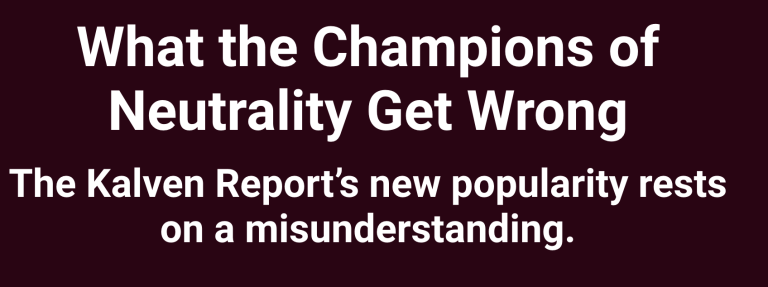John K. Wilson is identified in the new article below in the Chronicle of Higher Education (CHI) as “the author of eight books, including Patriotic Correctness: Academic Freedom and Its Enemies and the forthcoming The Attack on Academia.” In the piece below (access by clicking the headline), Wilson says that the concept of “official” academic neutrality, as embodied in the University of Chicago’s 1967 Kalven Report, has been misconstrued and misapplied.
Here are Wilson’s two beefs about Kalven (his words are indented):
1.) The Kalven Report was a 1967 product of the University of Chicago faculty, yet is adjudicated not by the faculty but by the university administration (Wilson’s words are indented):
The Kalven Report is a monument to faculty power. It was the product of a faculty committee, decreeing restraints on the administration purely in order to protect faculty freedoms. And faculty members were given the sole power to interpret these limits. The Kalven Report noted that “the application of principle to an individual case will not be easy”; it called for “faculty or students or administration to question, through existing channels such as the committee of the council or the council, whether in light of these principles the university in particular circumstances is playing its proper role.” In other words, the administration (like everyone else) is required to go to a faculty committee for any question about how to interpret the Kalven Report. (Unfortunately, the University of Chicago administration has been violating the Kalven Report for decades by imposing its own interpretations of neutrality without faculty consultation.)
2.) Wilson argues that the Kalven Report was meant to apply only to pronouncements by the University administration, not by University moieties like departments or Institutes:
The Kalven Report should also be followed for its approach to what institutional neutrality means, by limiting the term to actions and speech by top administrators on behalf of the entire college. The most dangerous betrayal of the Kalven Report’s principles is the extension of neutrality beyond the central administration to include all sub-units and faculty departments of a college.
Wilson is wrong—dead wrong—on both of these points, and was corrected by my Chicago colleague Brian Leiter (a law professor) in a letter to the CHE that came out just a few hours ago. Click below to read it:
From the letter:
Although John K. Wilson links to the actual text of the Kalven Report, he mischaracterizes it throughout his piece while alleging, ironically, that others “misunderstand” it (“More Colleges Are Swearing Off Political Positions. They’re Getting It Wrong”, The Chronicle Review, March 18). He declares that “shared-governance…is an essential part of the Kalven Report,” although it is not mentioned and has nothing to do with the principles articulated in that document. He says falsely that “the University of Chicago administration has been violating the Kalven Report for decades by imposing its own interpretations of neutrality without faculty consultation,” even though the Report requires no such consultation and even though, in the most recent cases, it was precisely faculty (including myself) who raised Kalven violations with the university, prompting it to act.
and
President Zimmer’s clarification made explicit longstanding understandings of Kalven’s principles; after all, as the report emphasizes, “The instrument of dissent and criticism is the individual faculty member or the individual student,” not the university or department or school. Kalven cautions that we “cannot resort to majority vote to reach positions on public issues,” which is exactly what many departments started doing in the wake of George Floyd’s murder. Department orthodoxy is, arguably, far more dangerous than university orthodoxy: An untenured faculty member might perhaps ignore the provost’s pronouncements about “systemic racism” but be more wary when her own department issues a statement of an official position.
Brian doesn’t pull any punches, and implicitly accuses Wilson of “lying” (yes, the word is used) about Kalven.
Leiter has also put a note about this on his own website, the Leiter Reports: A Philosophy Blog. Click to read:
Two bits from the blog (I’ve omitted Brian’s excerpt from the CHI letter):
Years ago, I was impressed that Mr. Wilson (a freelance “academic freedom” expert [sic] as it were) was one of the few who spoke up on behalf of the attack on the free speech rights of Ward Churchill. Alas, it’s now clear that his interest in free speech and academic freeodm is partisan through and through, as his astonishingly dishonest attack on the University of Chicago’s Kalven Report makes clear.
. . . Mr. Wilson is not as egregious an enemy of academic freedom as Jennifer Ruth or Michael Berube, but he is not an honest broker. (I have corresponded with Mr. Wilson about other academic freedom issues, after being e-introduced to him by Nadine Strossen, and my impression from that is that he was not very smart and not really interested in a principled conception of academic freedom. This latest incident confirms my impression then.)
As you see, no punches are pulled here, either. I’ve worked with Brian on Kalven, and although he can be brusque, he’s also efficient, eloquent, and, by Ceiling Cat, gets things done! Kalven has and is being enforced, and, by and large, it’s worked quite well here. While schools like Harvard, MIT, and Penn get in big trouble by lacking any academic neutrality and unevenly enforcing what speech policy they do have, the University of Chicago hasn’t been hauled before Congress, excoriated in the press, or lost any donors.



